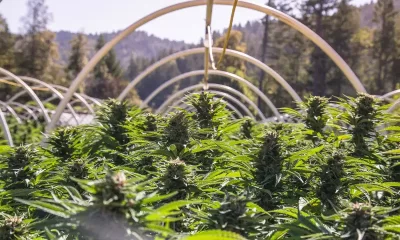Government
California Dept. of Fish and Wildlife Announces Enforcement for Illegal Cannabis Growing Season

California agencies are beginning to take on illegal cannabis cultivation in order to protect waterways and preserve animal habitats.
The California Department of Fish and Wildlife (CDFW), Department of Cannabis Control (DCC) and State Water Resource Board (SWRCB) announced in a press release on July 1 that it would be collectively authorizing enforcement teams for the 2022 cannabis growing season. This is an annual announcement, as the CDFW also announced its preparation for the 2021 growing season in July last year.
This effort is funded by Proposition 64 which enables these government agencies to focus on protecting “priority watersheds and areas with sensitive habitat and/or threatened or endangered species.” The agencies will work with local county, state, and federal groups to ensure enforcement is properly handled.
“The environmental impacts of illegal cannabis operations can last decades and cause irreparable harm to our natural resources,” said CDFW Deputy Director and Chief of the Law Enforcement Division David Bess. “Those not complying with state laws and disregarding the environmental impacts associated with illegal cultivation practices will be subject to enforcement actions.”
The water streams of California, and the wildlife that depends on them, suffer when illegal cannabis grow operations divert water. “Tributary streams are often critical in providing clear, cold water for larger waterways,” the press release states. “Many sensitive aquatic species such as southern torrent salamanders, coastal tailed frogs, steelhead and coho salmon rely on these tributaries in the late summer months to maintain water quality and temperatures necessary for survival.”
Furthermore, the health of these streams directly affects the “physical, biological, and chemical impact” of the entire local area, which is home to countless creatures whose habitat needs to be maintained.
The drought in California has hit a historic low once again, making it imperative to protect these waterways. “Complying with the state’s cannabis regulations is even more critical in drought conditions when limited water supply is available and water quality impacts are magnified,” said State Water Resources Control Board Office of Enforcement Director Yvonne West. “I am proud to work with so many individuals in the cannabis community dedicated to regulated and environmentally conscientious cultivation. The State Water Board is committed to taking enforcement action against those who harm our precious water resources.”
Santa Barbara County District Attorney Joyce Dudley also provided a statement, addressing the need for enforcement of illegal cannabis growing operations. “My office is committed to criminal and civil enforcement to protect the environment and public safety,” said Dudley. “Environmental harms from cannabis cultivation can be severe and long-term, including exposure to dangerous pesticides, water quality degradation, and wildlife injury. Moreover, cultivators who violate the law should not have an unfair competitive advantage over lawful cultivators who expend time and resources to stay in compliance. My office will continue to collaborate with our local and state agency partners to ensure compliance with the law.”
Other California counties, such as San Bernardino, are also supporting legislation aimed at both protecting groundwater as well as eliminating illegal grows. The County sponsored Assembly Bill 2728 and Senate Bill 1426, which would implement fines for violations. According to researchers, cannabis plants (depending on their stage of growth) could need up to six gallons of water per day during the growing season, which spans June through October.
At a press conference in May, Assemblymember Tom Lackey addressed illegal cannabis growers who are polluting local water reserves. “To any of those who are engaged in the illicit grows: I want you to know there’s a collective effort, and we’re coming after you,” said Lackey. “You come after a very sacred thing: our community. You come after our desert, and you’re stealing our water. You’re poisoning our land, and enough is enough.”
Outside of the growing season, Los Angeles County has also worked on targeting illegal grows. In July 2021, the Los Angeles County Sheriff’s Department made one of its largest seizures of illegal cannabis, which was valued at $1.2 billion.
Business
New Mexico cannabis operator fined, loses license for alleged BioTrack fraud

New Mexico regulators fined a cannabis operator nearly $300,000 and revoked its license after the company allegedly created fake reports in the state’s traceability software.
The New Mexico Cannabis Control Division (CCD) accused marijuana manufacturer and retailer Golden Roots of 11 violations, according to Albuquerque Business First.
Golden Roots operates the The Cannabis Revolution Dispensary.
The majority of the violations are related to the Albuquerque company’s improper use of BioTrack, which has been New Mexico’s track-and-trace vendor since 2015.
The CCD alleges Golden Roots reported marijuana production only two months after it had received its vertically integrated license, according to Albuquerque Business First.
Because cannabis takes longer than two months to be cultivated, the CCD was suspicious of the report.
After inspecting the company’s premises, the CCD alleged Golden Roots reported cultivation, transportation and sales in BioTrack but wasn’t able to provide officers who inspected the site evidence that the operator was cultivating cannabis.
In April, the CCD revoked Golden Roots’ license and issued a $10,000 fine, according to the news outlet.
The company requested a hearing, which the regulator scheduled for Sept. 1.
At the hearing, the CCD testified that the company’s dried-cannabis weights in BioTrack were suspicious because they didn’t seem to accurately reflect how much weight marijuana loses as it dries.
Company employees also poorly accounted for why they were making adjustments in the system of up to 24 pounds of cannabis, making comments such as “bad” or “mistake” in the software, Albuquerque Business First reported.
Golden Roots was fined $298,972.05 – the amount regulators allege the company made selling products that weren’t properly accounted for in BioTrack.
The CCD has been cracking down on cannabis operators accused of selling products procured from out-of-state or not grown legally:
- Regulators alleged in August that Albuquerque dispensary Sawmill Sweet Leaf sold out-of-state products and didn’t have a license for extraction.
- Paradise Exotics Distro lost its license in July after regulators alleged the company sold products made in California.
Golden Roots was the first alleged rulebreaker in New Mexico to be asked to pay a large fine.
Source: https://mjbizdaily.com/new-mexico-cannabis-operator-fined-loses-license-for-alleged-biotrack-fraud/
Business
Marijuana companies suing US attorney general in federal prohibition challenge

Four marijuana companies, including a multistate operator, have filed a lawsuit against U.S. Attorney General Merrick Garland in which they allege the federal MJ prohibition under the Controlled Substances Act is no longer constitutional.
According to the complaint, filed Thursday in U.S. District Court in Massachusetts, retailer Canna Provisions, Treevit delivery service CEO Gyasi Sellers, cultivator Wiseacre Farm and MSO Verano Holdings Corp. are all harmed by “the federal government’s unconstitutional ban on cultivating, manufacturing, distributing, or possessing intrastate marijuana.”
Verano is headquartered in Chicago but has operations in Massachusetts; the other three operators are based in Massachusetts.
The lawsuit seeks a ruling that the “Controlled Substances Act is unconstitutional as applied to the intrastate cultivation, manufacture, possession, and distribution of marijuana pursuant to state law.”
The companies want the case to go before the U.S. Supreme Court.
They hired prominent law firm Boies Schiller Flexner to represent them.
The New York-based firm’s principal is David Boies, whose former clients include Microsoft, former presidential candidate Al Gore and Elizabeth Holmes’ disgraced startup Theranos.
Similar challenges to the federal Controlled Substances Act (CSA) have failed.
One such challenge led to a landmark Supreme Court decision in 2005.
In Gonzalez vs. Raich, the highest court in the United States ruled in a 6-3 decision that the commerce clause of the U.S. Constitution gave Congress the power to outlaw marijuana federally, even though state laws allow the cultivation and sale of cannabis.
In the 18 years since that ruling, 23 states and the District of Columbia have legalized adult-use marijuana and the federal government has allowed a multibillion-dollar cannabis industry to thrive.
Since both Congress and the U.S. Department of Justice, currently headed by Garland, have declined to intervene in state-licensed marijuana markets, the key facts that led to the Supreme Court’s 2005 ruling “no longer apply,” Boies said in a statement Thursday.
“The Supreme Court has since made clear that the federal government lacks the authority to regulate purely intrastate commerce,” Boies said.
“Moreover, the facts on which those precedents are based are no longer true.”
Verano President Darren Weiss said in a statement the company is “prepared to bring this case all the way to the Supreme Court in order to align federal law with how Congress has acted for years.”
While the Biden administration’s push to reschedule marijuana would help solve marijuana operators’ federal tax woes, neither rescheduling nor modest Congressional reforms such as the SAFER Banking Act “solve the fundamental issue,” Weiss added.
“The application of the CSA to lawful state-run cannabis business is an unconstitutional overreach on state sovereignty that has led to decades of harm, failed businesses, lost jobs, and unsafe working conditions.”
Business
Alabama to make another attempt Dec. 1 to award medical cannabis licenses

Alabama regulators are targeting Dec. 1 to award the first batch of medical cannabis business licenses after the agency’s first two attempts were scrapped because of scoring errors and litigation.
The first licenses will be awarded to individual cultivators, delivery providers, processors, dispensaries and state testing labs, according to the Alabama Medical Cannabis Commission (AMCC).
Then, on Dec. 12, the AMCC will award licenses for vertically integrated operations, a designation set primarily for multistate operators.
Licenses are expected to be handed out 28 days after they have been awarded, so MMJ production could begin in early January, according to the Alabama Daily News.
That means MMJ products could be available for patients around early March, an AMCC spokesperson told the media outlet.
Regulators initially awarded 21 business licenses in June, only to void them after applicants alleged inconsistencies with how the applications were scored.
Then, in August, the state awarded 24 different licenses – 19 went to June recipients – only to reverse themselves again and scratch those licenses after spurned applicants filed lawsuits.
A state judge dismissed a lawsuit filed by Chicago-based MSO Verano Holdings Corp., but another lawsuit is pending.
Source: https://mjbizdaily.com/alabama-plans-to-award-medical-cannabis-licenses-dec-1/
-

 Business2 years ago
Business2 years agoPot Odor Does Not Justify Probable Cause for Vehicle Searches, Minnesota Court Affirms
-

 Business2 years ago
Business2 years agoNew Mexico cannabis operator fined, loses license for alleged BioTrack fraud
-

 Business2 years ago
Business2 years agoAlabama to make another attempt Dec. 1 to award medical cannabis licenses
-

 Business2 years ago
Business2 years agoWashington State Pays Out $9.4 Million in Refunds Relating to Drug Convictions
-

 Business2 years ago
Business2 years agoMarijuana companies suing US attorney general in federal prohibition challenge
-

 Business2 years ago
Business2 years agoLegal Marijuana Handed A Nothing Burger From NY State
-

 Business2 years ago
Business2 years agoCan Cannabis Help Seasonal Depression
-

 Blogs2 years ago
Blogs2 years agoCannabis Art Is Flourishing On Etsy













